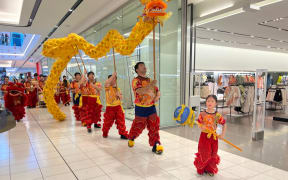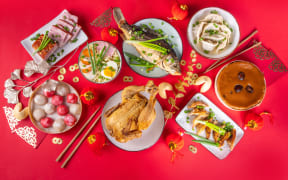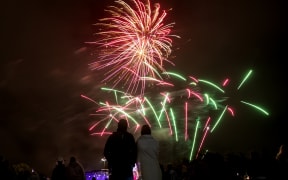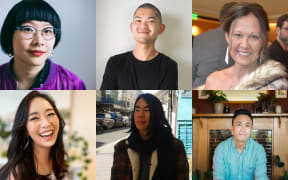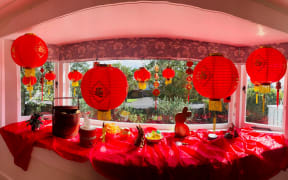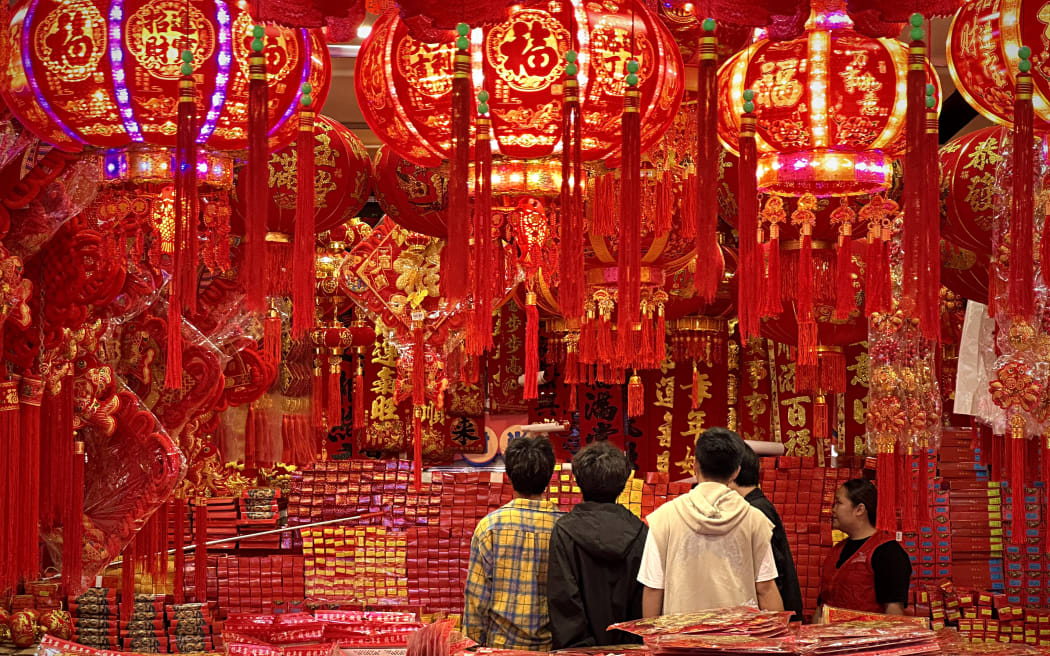
A supermarket in Sanya in southern China sells decorations prior to the 2024 Lunar New Year. Photo: RNZ / Ziming Li
The Chinese Lunar New Year (Xīn Nián, 新年), also known as the Spring Festival (Chūn Jié, 春节), is one of China's most important festivals, falling on 10 February this year.
Dating back thousands of years, Lunar New Year celebrations vary from region to region in mainland China and beyond.
Many traditions associated with new year celebrations focus on bidding farewell to the old and ushering in the new, family reunions, ancestral worship and prayers in search of good luck and prosperity.
While the festive period's duration is likely to differ depending on each region, the Laba Festival typically marks the beginning of celebrations. The season typically ends with celebrations for the Lantern Festival about a month later.
New year celebrations typically feature dedicated culinary dishes and decorations, red packets of lucky money, fireworks, cultural performances and endless gatherings with family, relatives and friends.
Laba Festival
According to an old proverb, "after Laba, it's the New Year".
"La" is the name given to the 12th and final month in the Chinese lunar calendar, while "ba" means number eight.
Many families start preparing for new year celebrations from the eighth day of the last month of the lunar calendar. This year, it fell on 18 January.
Many households in China traditionally enjoy a bowl of Laba congee on this day. The dish consists of rice, dates, peanuts, longan, lotus seeds and beans to celebrate the harvest as well as express wishes for good luck in the coming year.
Deep clean
As New Year's Day draws nearer, households will give their house a thorough clean.
As the words "dust" (chén, 尘) and "old" (chén, 陈) are homophonous in Chinese, sweeping away the dust symbolises removing the old and replacing it with the new.
According to Chinese folklore, cleaning should be completed on the 24th day of the 12th lunar month of the year. In modern times, however, people are more flexible about this date.
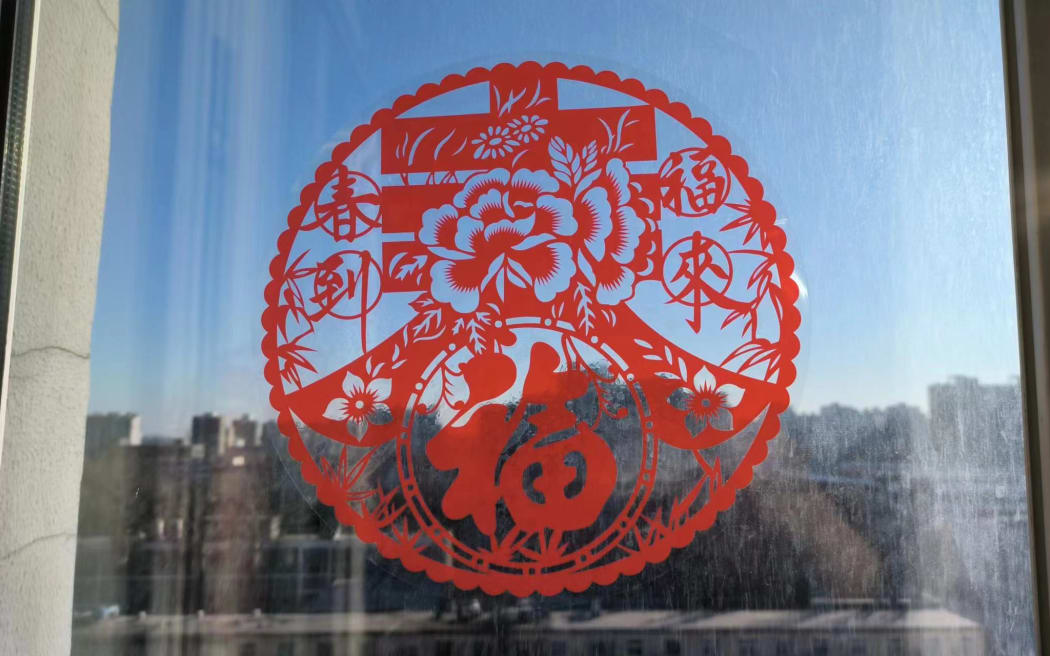
Paper-cuttings featuring characters that represent "spring" and "fortune". Photo: Supplied
Decorations
Spring couplets, new year paintings, red paper-cuttings and the character "fú" ("fortune", 福) are commonplace decorations for households as well as businesses over the festive season.
Spring couplets are a pair of poetry lines that adhere to certain rules, expressing people's hope for happiness, luck and good fortune. They are often placed on the frame of a door.
New year paintings and paper-cuttings feature a variety of content, but all possess a common thread of keeping evil spirits away and praying for good fortune.
New Year's Eve dinner
For many families, dinner on New Year's Eve is often regarded as the most important meal of the year. No matter how far away people are, they often travel back to their hometown for a much-cherished family reunion.
The meal is often a home-cooked feast containing a spectacular array of dishes. Some of these servings - for example, cured meat - are often prepared weeks before the actual dinner.
Although different regions might celebrate new year by enjoying different cuisine, all locations will be sure to cook dishes that people believe will bring good luck in the year ahead, including fish (abundance), dumplings (wealth) or sticky rice cake (progress).
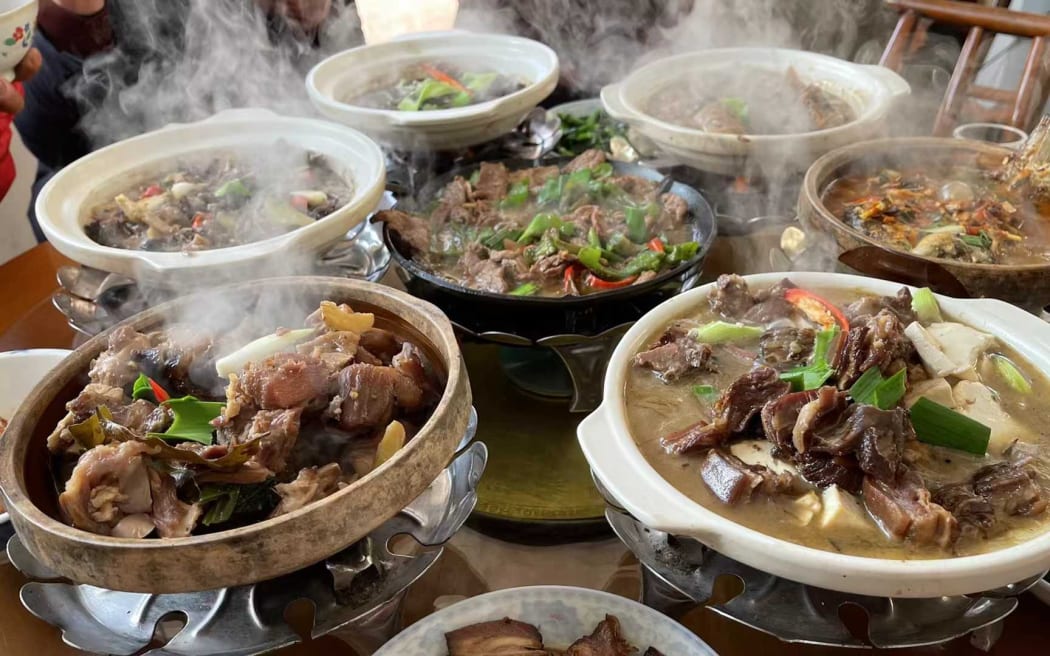
A household in China's Hunan province enjoys dinner on New Year's Eve that includes a whole fish. Photo: Supplied
Limin Bai, a senior lecturer in Chinese studies at Victoria University in Wellington, says many families have tended to opt for dinner in a restaurant on New Year's Eve in recent years.
Travelling overseas has also become popular, Bai says. "Urban dwellers have witnessed a transformation in these customs."
Watching the New Year Gala TV show produced by China Central Television had also become a tradition for families since the 1980s, but interest has faded in recent decades, most likely due to increased options that many households have.
Fireworks
Fireworks are a traditional part of celebrations for the new year, and it's almost a necessity for nearly every household on New Year's Eve.
"As the clock strikes midnight, the noise of fireworks builds to a climax, bidding farewell to the old year and ushering in a new one," Bai says.
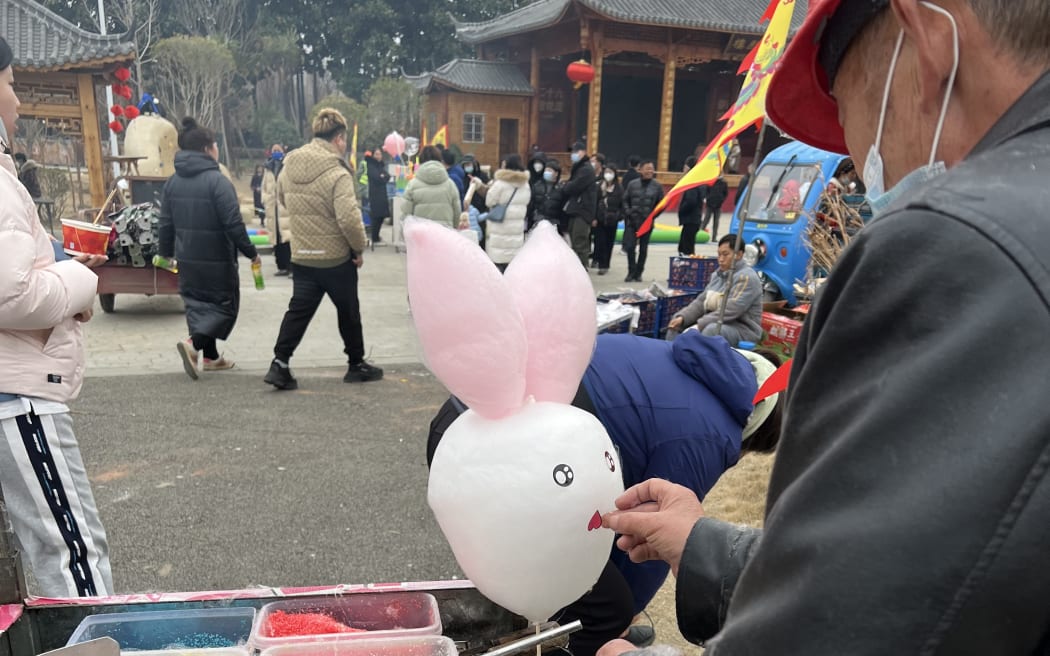
A temple fair in Hubei, China, in 2023. Photo: RNZ / Liu Chen
According to a Chinese folktale, a sea monster called Nian comes ashore on New Year's Eve each year to hunt people and livestock.
Villagers discovered that the crackle of burning bamboo (an early form of fireworks), the colour red and bright lights helped to scare the monster away, so they have set off fireworks and decorated their houses with red ornaments ever since.
Many places in China now have restrictions in place that control when and where people can light fireworks.
All-night vigil
Shǒu suì (守岁) refers to the act of staying up on New Year's Eve until dawn the following day. These days, however, many people only stay awake until midnight.
After dinner on New Year's Eve, families will sit down together, light a candle or an oil lamp, and catch up over casual conversation, with many playing games or watching television.
People traditionally believe the all-night vigil can eliminate evil spirits and plagues and bring good fortune to the family over the coming 12 months.
It's also believed that children who stay up all night have the added benefit of increasing the longevity of their parents.
New year greetings
On the first day of the new year, people typically wake up early, dress in new clothes and head out to visit relatives and friends - a custom called bài nián (拜年). The visitors bring gifts, share a meal and wish each other good fortune for the coming year.
During the visits, older and senior members of the family typically give red envelopes containing lucky money to children. The money is called yā suì qián (压岁钱), which many believe keeps evil spirits away from children, enabling them to have a safe year ahead.
In recent times, people also send New Year's greetings through mobile phone calls and social media, with red packets being exchanged via a digital transfer.
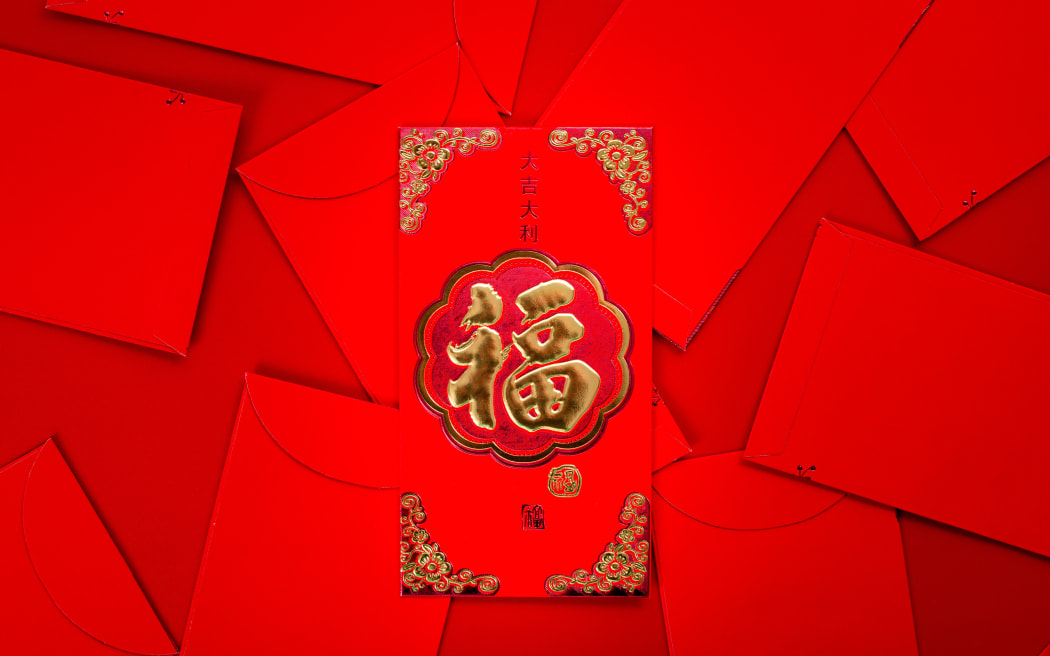
Many believe that yā suì qián keeps evil spirits away from children. Photo: 123RF
Other activities
Lion and dragon dances are popular during the Lunar New Year, which people use to pray for protection, a bountiful harvest and good luck.
Families also visit markets around temples - miào huì (庙会) - to enjoy cultural performances, art and street food. Religious performances are sometimes held as well.
Households generally believe that it's important to worship their ancestors during the Lunar New Year. Although different areas worship in different ways at different times and on different days, many rituals involve giving an offering, burning incense and kowtowing.
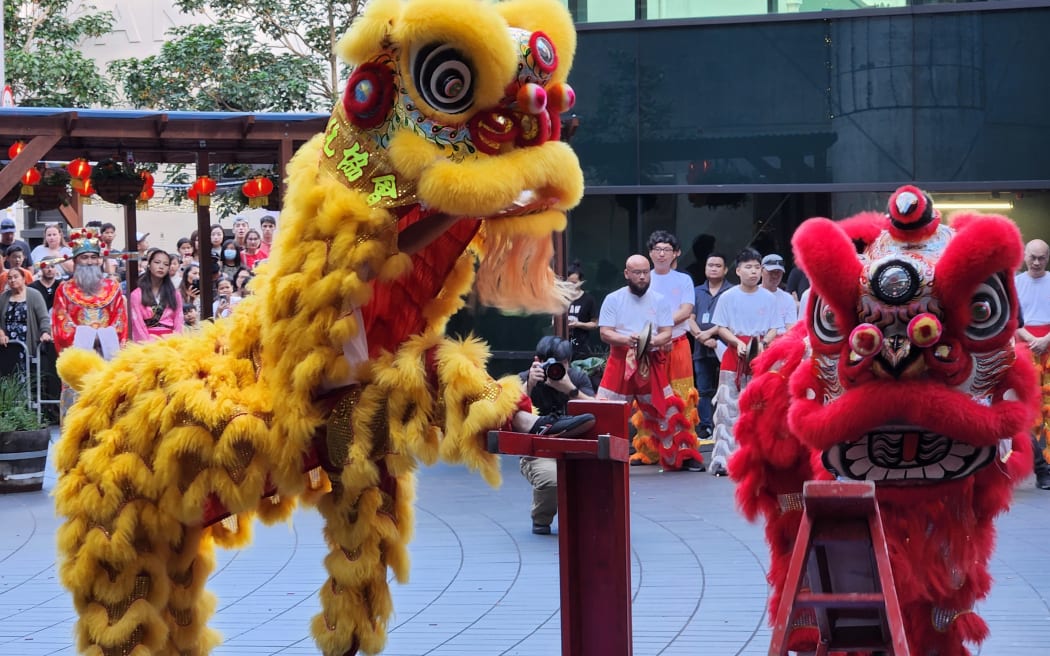
People gather beneath Auckland Sky Tower in January 2023 to watch a lion dance and other cultural performances. Photo: RNZ / Lucy Xia
Taboos
Many Chinese people believe the actions one takes at the start of the year will affect their luck over the subsequent 12 months, so certain things are avoided during the first few days of the year.
One is not advised to clean their house or put out rubbish on the first day of the year, as they might as well be throwing away any wealth or good fortune they might receive in the year.
It's also better to avoid breaking a bowl, mirror or glass item as it would be akin to breaking one's good luck for the year. If an item is broken, you might be able to protect yourself from ill fortune by wrapping the fragments in red paper and saying "suì suì píng'ān" (岁岁平安), which roughly means "peace all year round".
It's also considered bad luck to wash one's hair or get a haircut on New Year's Day, as well as wash clothes on either the first or second day of the year.
Using knives or killing animals over the festive season is generally considered to be ominous.
In some parts of China, people believe that it's best to avoid cooking on the first day of the new year. Instead, they eat leftovers as it symbolises an abundance of food.
If a person is handing out lucky money, avoid odd amounts because many Chinese people believe good things always come in pairs.


